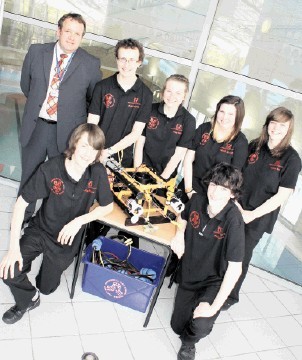
BUDDING engineers from a Dundee high school have scooped a leading student design award for their work on a prototype remotely-operated vehicle.
A group of youngsters from Menzieshill High School competed in the final of the annual MATE ROV design challenge, a global design challenge held in Houston.
They were tasked with creating an ROV designed to carry out underwater tasks from scratch.
This year’s challenge was themed around the technology and methods used to seal the oil leak on the Deepwater Horizon platform in the Gulf of Mexico in April 2010.
This meant the student teams had to pilot their ROVs and use the specialist tools they had designed to repair and cap an improvised oil well, and then collect biological samples including models of crabs, sea cucumbers and sponges.
Awarding the Menzieshill team the Design Engineering Elegance Award, judges commended the compact form of their ROV compared to all other entrants and an innovative detachable tether connection.
A team from Aberdeen’s Robert Gordon University also took part in the event, which saw teams battle it out for world titles at junior and senior levels at the Nasa Johnson Space Centre, including in its neutral buoyancy lab.
The Menzieshill team had competed in the Ranger class final, having won first place at the European regional final at the Robert Gordon University in April.
They beat schools from across Scotland including Bannockburn High, Brechin High School, Mearns Academy, Inverurie Academy, Bucksburn Academy and Robert Gordon’s College.
The regional event also saw the Robert Gordon University student team go through to the Explorer Class international final.
Grant Maxwell, associate head of the school of engineering at the university, said: “We are very pleased that the ROV competition has grown year on year.
“The ROV project is part of a wider programme of joint working between Robert Gordon University and industry organisations.
“Such joint initiatives represent flourishing working relationships which continue to bring significant opportunities to the north-east of Scotland.
“The competition has had a positive effect on the teaching of technology in the area and has encouraged more pupils to study technology.
“Some of our graduates have gone on to work in the ROV industry as a direct result of this competition.”
The design challenge is co-ordinated each year by the Marine Advanced Technology Education (MATE) Centre in California, US.
It sees 20 ROV contests taking place across North America, Europe, Japan and Hong Kong. Teams from schools, colleges, universities and community organisations take part in the events, which consist of different classes according to the sophistication of the ROVs – Ranger and Explorer class.